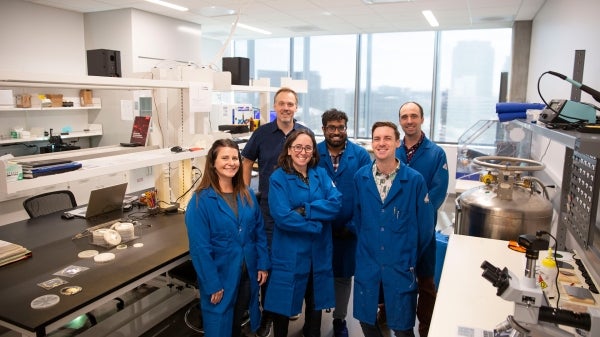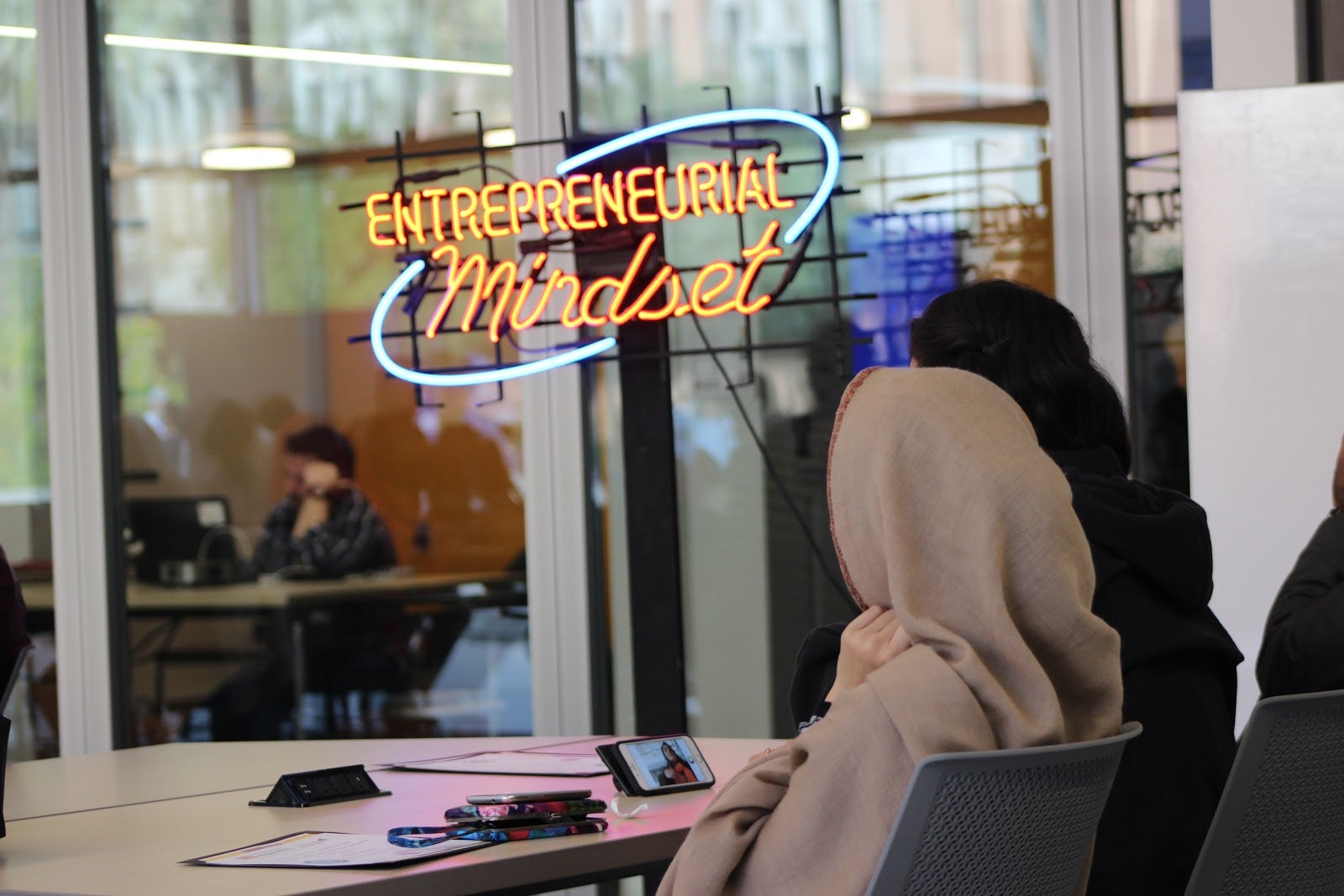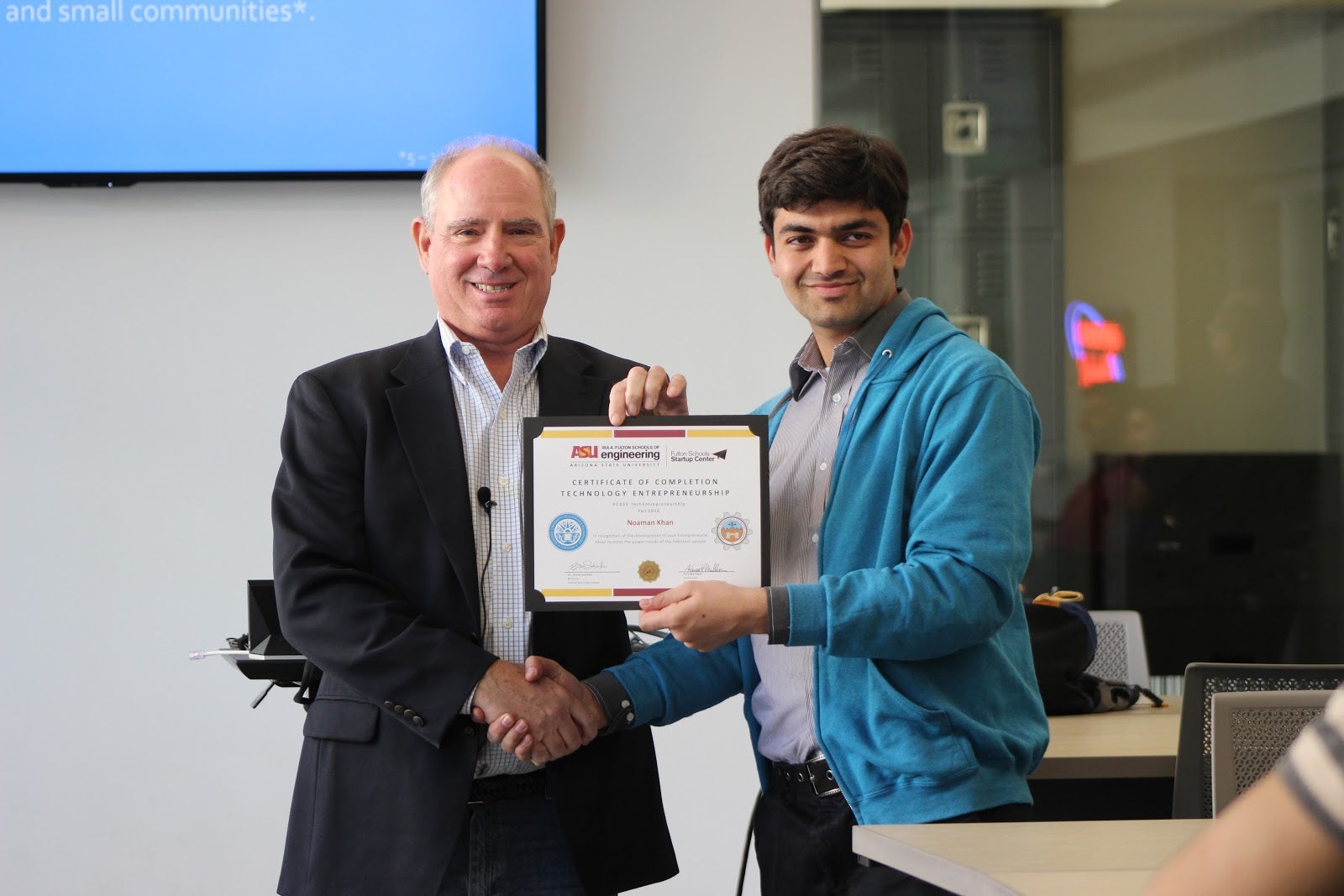Project energizes entrepreneurial aspirations for Pakistani scholars

Kenneth Mulligan, professor for the U.S.-Pakistan Centers for Advanced Studies in Energy, presents Pakistani exchange scholar Nafeesa Irshad with her certificate of completion for the entrepreneurship portion of the program. Photo by Erika Gronek/ASU
A second cohort of Pakistani engineering scholars has completed their entrepreneurship course of study at Arizona State University as part of the USPCAS-E program. In addition to entrepreneurship, the students are also studying engineering and policy in an effort to improve their country’s energy prospects.
U.S.-Pakistan Centers for Advanced Studies in Energy is a U.S. Agency for International Development project focused on applied research relevant to Pakistan’s energy needs. The project, which is a partnership between Arizona State University and two leading Pakistani universities, aims to produce skilled graduates in the field of energy.
ASU entrepreneurship professor Kenneth Mulligan said: “The intention of the program is to improve availability of clean, reliable power in Pakistan. Strategic innovation and entrepreneurship provides a pathway for widespread implementation of their innovative technical solutions.
“Pakistan is subject to rolling blackouts that impede stability, progress and business. The problems faced in Pakistan are not easy problems, which is why coming up with solutions that reside outside the box are so critical,” said Mulligan, who has taught and mentored both cohorts so far.
“They get to use causative thinking, systems analysis and technical feasibility to solve complex technical problems in energy generation and distribution. However, this problem-solving approach and skillset is insufficient in the development of innovative and disruptive products and technologies.”
Scholars from the U.S.-Pakistan Centers for Advanced Studies in Energy learn about the entrepreneurial mindset at the Ira A. Fulton Schools of Engineering Generator Labs. Photo by Erika Gronek/ASU
Mulligan thinks all of the scholars' final projects have market potential. All 27 of the visiting scholars, six of whom are women, took Mulligan’s class.
One project of particular interest was presented by Nafeesa Irshad. Irshad’s project involved developing a solar-powered drinking water purification system, which addresses both Pakistan’s need for renewable energy and clean water.
“In Pakistan, the unsafe drinking water is the main cause of children’s deaths and other health issues,” Irshad said.
“This system would be reliable to provide safe water to the people through its high temperature and UV C action,” Irshad said.
UV C, a type of ultraviolet light, kills microbes and cleans the water. “It would be [a] more energy-efficient system as compared to existing reverse osmosis technologies.”
Kenneth Mulligan, professor for the U.S.-Pakistan Centers for Advanced Studies in Energy, presents Pakistani exchange scholar Noaman Khan with his certificate of completion for the entrepreneurship portion of the program. Photo by Erika Gronek/ASU
Noaman Khan, another enterprising student in the class has the idea to pursue low-cost catalysts for proton exchange membrane (PEM) fuel cells.
He wants to find new materials that can possibly replace platinum as a catalyst because the material is so cost-prohibitive. A more affordable, durable and reliable catalyst would reduce the cost of fuel cells, therefore opening up a market opportunity, according to Khan. Future applications could include the large-scale commercialization of the technology for automotive and other fuel cell applications.
Khan said of the program that it, “is not about publishing research papers but [about] solving Pakistan’s energy problem. It requires science and entrepreneurship to go side by side. I didn't realize it before this course. We should make discoveries that can create value.”
According to Mulligan, “Entrepreneurship gets them to think about implementation and commercial feasibility. It’s a way to connect their engineering skillset with an entrepreneurial mindset. Who has the problem? What is their true pain point? What solution solves both the technical feasibility and commercial feasibility? The benefits are enormous. It equips them to think in terms of real impact on their communities back in Pakistan.”
“My task is to instruct them in lean methodology — the core of tech entrepreneurship — and to inspire and mentor their abilities to solve problems through tech entrepreneurship and commercialization,” Mulligan added.
ASU is leading the U.S.-Pakistan Centers for Advanced Studies in Energy in a collaboration sponsored by the U.S. Agency for International Development and Pakistan’s Higher Education Commission.
An $18 million USAID grant supports the project with ASU as the hub for the energy component of the project in partnership with the National University of Science and Technology – Islamabad and the University of Engineering and Technology in Peshawar and Oregon State University.
The scholars who now see themselves as problem solvers and value creators hope to take their plans back home and turn those ideas into entrepreneurial ventures in Pakistan’s energy sector.
More Science and technology

ASU professor honored with prestigious award for being a cybersecurity trailblazer
At first, he thought it was a drill.On Sept. 11, 2001, Gail-Joon Ahn sat in a conference room in Fort Meade, Maryland.…

Training stellar students to secure semiconductors
In the wetlands of King’s Bay, Georgia, the sail of a nuclear-powered Trident II Submarine laden with sophisticated computer…

ASU startup Crystal Sonic wins Natcast pitch competition
Crystal Sonic, an Arizona State University startup, won first place and $25,000 at the 2024 Natcast Startup Pitch Competition at…

